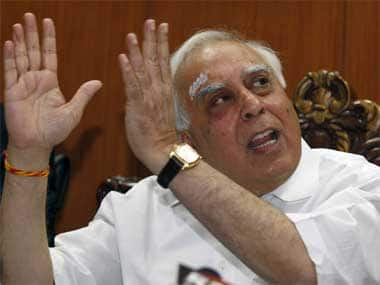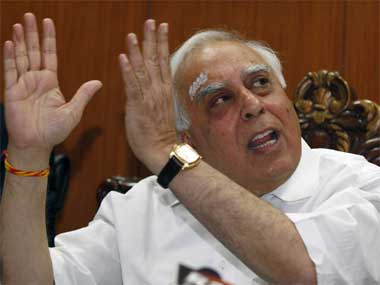We are asking for a more participatory democracy. Getting elected every five years and then forgetting about the people is not what democracy is about. Allow the people to have a voice in the policies and laws that govern them,’’ civil society activist Prashant Bhushan told The Economic Times on 24 April. Two months and several acrimonious showdowns between representatives of civil society and the government later, the latter has virtually shut the door on any outside participation in law-making initiatives in future. On Sunday, Communications and HRD Minister Kapil Sibal made it clear that the collaboration for the Lokpal Bill was a one-off case and should not be taken as a precedent. [caption id=“attachment_32301” align=“alignleft” width=“380” caption=“Sibal’s statement comes at a time when the NAC has recently approved creating a framework for pre-legislative consultation. Reuters”]
 [/caption] “In the given situation the government was in, it was a decision that we took with open eyes and I don’t consider it to be a precedent,” he told reporters. Interesting, considering that the Sonia Gandhi-led National Advisory Council, basically a civil society body, has just come out with the crucial Food Security Bill and Communal Violence Bill, which the government will table in Parliament in this upcoming monsoon session. Not many within the UPA or the Congress are happy with the NAC’s recommendation in the case of the Food Security Bill, given its possible disastrous consequences for the economy. But they are in no position to ignore Sonia. Moreover, Sibal’s statement comes at a time when the NAC has recently approved creating a framework for pre-legislative consultation allowing civil society members to be heard at various stages of law-making. Under these circumstances his assertion thus sounds incongruous. It’s difficult to attach a lot of significance to his statement given the complex relationship between the government and the Congress. There are several forces active within the government, lending credence to the BJP’s recent allegation that ``the left hand does not what the right is doing’’. Something is seriously amiss between the government and the party. The channels of communication seem to have broken down completely. It’s not easy to attribute such statements to deliberate Congress efforts to mislead people any more. Coming back to the collaboration between civil society and the government, if the later is serious, more specifically if Sibal is taken seriously, the country has missed a chance to experiment with participatory democracy. Not that people like Baba Ramdev and Anna Hazare have given a great deal of respectability to civil society by their confrontational approach, but they have at least helped announce the existence of citizens’ groups to the larger world. The government could be planning to leave an opening for civil society in matters of important legislation through the NAC. But given the number of different voices in party and the government, it’s difficult to put a finger on the actual design.
[/caption] “In the given situation the government was in, it was a decision that we took with open eyes and I don’t consider it to be a precedent,” he told reporters. Interesting, considering that the Sonia Gandhi-led National Advisory Council, basically a civil society body, has just come out with the crucial Food Security Bill and Communal Violence Bill, which the government will table in Parliament in this upcoming monsoon session. Not many within the UPA or the Congress are happy with the NAC’s recommendation in the case of the Food Security Bill, given its possible disastrous consequences for the economy. But they are in no position to ignore Sonia. Moreover, Sibal’s statement comes at a time when the NAC has recently approved creating a framework for pre-legislative consultation allowing civil society members to be heard at various stages of law-making. Under these circumstances his assertion thus sounds incongruous. It’s difficult to attach a lot of significance to his statement given the complex relationship between the government and the Congress. There are several forces active within the government, lending credence to the BJP’s recent allegation that ``the left hand does not what the right is doing’’. Something is seriously amiss between the government and the party. The channels of communication seem to have broken down completely. It’s not easy to attribute such statements to deliberate Congress efforts to mislead people any more. Coming back to the collaboration between civil society and the government, if the later is serious, more specifically if Sibal is taken seriously, the country has missed a chance to experiment with participatory democracy. Not that people like Baba Ramdev and Anna Hazare have given a great deal of respectability to civil society by their confrontational approach, but they have at least helped announce the existence of citizens’ groups to the larger world. The government could be planning to leave an opening for civil society in matters of important legislation through the NAC. But given the number of different voices in party and the government, it’s difficult to put a finger on the actual design.
Govt, NAC on different planets vis-à-vis civil society
Akshaya Mishra
• June 27, 2011, 17:36:44 IST
Negotiation with Team Anna was one-off, says Sibal even as Sonia’s NAC seeks framework for pre-legislation consultation with civil society.
Advertisement
)
End of Article